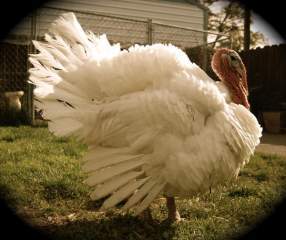I would like some insight regarding my turkey. While he outlasted the female, who had to be culled due to a collapsed cloaca, there are signs that he is in the advanced stages of congestive heart failure. His breast has been extended and, if tapped, has sounded hollow or fluid-filled for a couple of months. He has always breathed heavily, but last week I noticed he makes a gargling sound when breathing. There are no signs of a cold such as watery eyes, listlessness, sneezing (other than to clear phlegm from his nostrils), or runny nose and no signs of illness in any other bird (all chickens) within the coop. The first thing I thought was congestive heart failure. Yesterday I noticed tiny blood spatters on his back. Today I realized this is probably from the buildup of blood in his lungs and resulted from sneezing or shaking his head.
Currently, Ataturk weighs 50 lbs.

He is a sweet turkey and, had I known earlier about what the meat production industry has done to these animals, I would have chosen a wild or heritage breed as a pet. But, so it goes. He has lived a good, happy life which probably accounts for the fact that he has lived to nearly one year in a stress-free environment without overcrowding and other horribly conditions.
We gave the hen, Turkle, to the mother-in-law when we had to cull her. It was reported to us that her meat was tough. My question is whether or not Ataturk will be any good as a meat bird when he dies? I'm thinking not and that we should bury him out in the country, but I would like to know what the general consensus is regarding this matter. I would also like to know from others whether or not my diagnosis of congestive heart failure sounds accurate.
Thank you for your time and knowledge.
Currently, Ataturk weighs 50 lbs.

He is a sweet turkey and, had I known earlier about what the meat production industry has done to these animals, I would have chosen a wild or heritage breed as a pet. But, so it goes. He has lived a good, happy life which probably accounts for the fact that he has lived to nearly one year in a stress-free environment without overcrowding and other horribly conditions.
We gave the hen, Turkle, to the mother-in-law when we had to cull her. It was reported to us that her meat was tough. My question is whether or not Ataturk will be any good as a meat bird when he dies? I'm thinking not and that we should bury him out in the country, but I would like to know what the general consensus is regarding this matter. I would also like to know from others whether or not my diagnosis of congestive heart failure sounds accurate.
Thank you for your time and knowledge.
Last edited:




